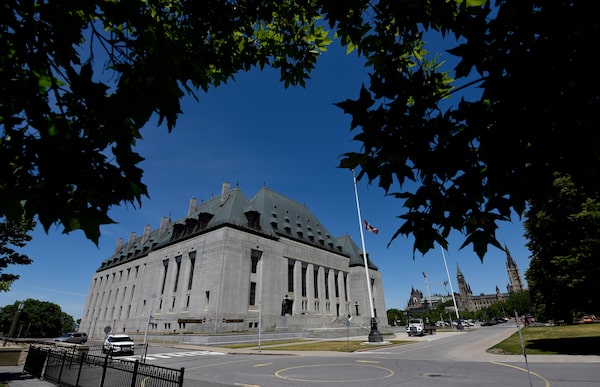
The Supreme Court of Canada, in Ottawa, in 2021.Justin Tang/The Canadian Press
If a person doesn’t use a condom during sex despite being required to do so by their partner, they could be guilty of sexual assault, the Supreme Court ruled on Friday in a decision that scholars and lawyers are calling extremely significant.
The court’s decision makes clear that sex with a condom and sex without a condom are not the same thing – stating that the two acts are “fundamentally and qualitatively different.”
“A complainant who consents to sex on the condition that their partner wear a condom does not consent to sex without a condom,” Justice Sheilah Martin wrote for the majority. “Since only yes means yes and no means no, it cannot be that ‘no, not without a condom’ means ‘yes, without a condom.’”
In recent years, awareness has increased of non-consensual condom refusal or removal. The term can refer to a variety of violations, from a man refusing to wear a condom when asked; pretending to put on a condom, but not doing so; and secretly removing a condom partway through sex, which has been referred to as “stealthing.”
In a 2019 study of undergraduate students a Canadian university, among the 334 participants who said they had, at one point, engaged in penetrative sex with a male partner and used a condom, 18.7 per cent said they had experienced non-consensual condom removal.
“There’s a growing public conversation around non-consensual condom refusal and condom removal, and what we’ve seen today is the law catching up to that conversation,” said Kate Feeney, director of litigation at West Coast Legal Education and Action Fund, which was an intervenor in the case.
The court’s decision stems from a sexual-assault charge against Ross Kirkpatrick, a B.C. man, who in March, 2017, met a woman to discuss the possibility of having sex. During that conversation, the woman, whose identity is protected by a publication ban, said that she made clear she would have sex with him only if he used a condom.
At their second meeting, the pair had sex twice. The first time, Mr. Kirkpatrick used a condom. The second time, the woman thought he had put a condom on, but when he ejaculated inside her, she realized he had not, according to the woman’s testimony, which is referred to in the court’s decision.
Several experts told The Globe that Friday’s decision sets an important precedent in Canada – and potentially beyond.
“It’s certainly significant for women in this country – it’s also internationally significant,” said Lise Gotell, a professor of women’s and gender studies at the University of Alberta. “In no other jurisdiction now is there such clarity in the law that when you consent to sex with a condom, you are not consenting to sex without. … This is an incredibly important decision.”
Initially, a provincial court in British Columbia dismissed the charge against Mr. Kirkpatrick, applying a standard from a Supreme Court decision in a sexual-assault case known as Hutchinson, in which a man poked holes in condoms without his partner knowing. In that case, the court decided the woman had consented to the “sexual activity in question,” but that the consent was obtained by fraud, and upheld the man’s conviction.
The provincial court ruled that because the woman agreed to have sex with Mr. Kirkpatrick, she agreed to the “sexual activity in question” and there was no evidence of fraud.
The Supreme Court unanimously ruled in a favour of a new trial in Mr. Kirkpatrick’s case.
The Supreme Court decision makes clear that non-consensual condom removal can be assessed under the definition of consent in the Criminal Code, rather than by proving the existence of fraud, although it states that cases specifically involving “condom sabotage” must still be assessed through Hutchinson.
“It is making clear that everybody has the right to insist on a condom being used, and where that is not used – through whatever means, deceptive or not – that is sexual assault,” said Isabel Grant, a professor at the Allard School of Law at the University of British Columbia.
While the judges unanimously agreed that a new trial is needed in the Kirkpatrick case, their reasonings differed, with five siding with Justice Martin and four making a separate argument.
Our Morning Update and Evening Update newsletters are written by Globe editors, giving you a concise summary of the day’s most important headlines. Sign up today.